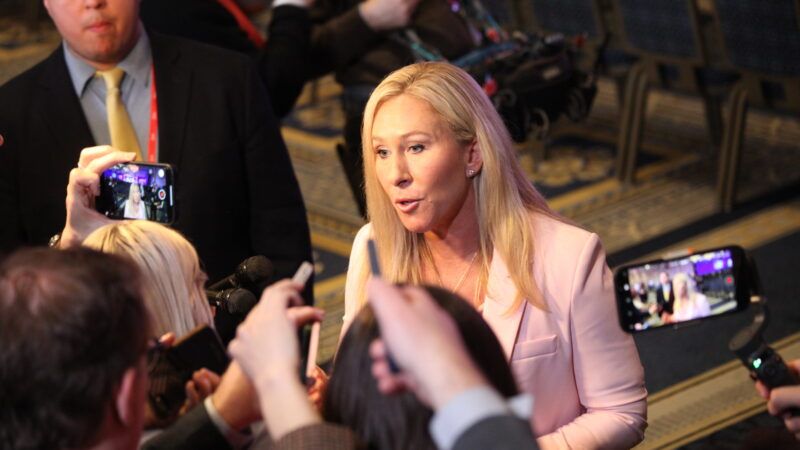At CPAC, Trans Issues Dominated. But Do Voters Care?
While inflammatory comments about "gender ideology" abounded at CPAC, the issue is hardly a top priority for Americans in general.

From the speeches at this year's Conservative Political Action Conference (CPAC), it would be easy to assume that transgender issues were the most pressing subject in American politics. In speech after speech, panel after panel, speakers hammered home the dangers of "gender ideology" and the importance of banning underage gender transitions and keeping school sports and bathrooms sex-segregated.
At CPAC, Rep. Marjorie Taylor Greene (R–Ga.) warned about a "billion-dollar industry that mutilates the genitals of children." Presidential candidate and former South Carolina Gov. Nikki Haley said that President Joe Biden was making soldiers take "gender pronoun classes." Conservative commentator Michael Knowles said, "Transgenderism must be eradicated from public life." While their comments seemed to rile up the audience at CPAC, how do such statements play with the broader Republican base—or the independent voters they'll need to sway in 2024?
Based on available polling data, not only do many self-identified Republicans and independents often have complex views on transgender issues, but it simply isn't a topic that ranks highly in Americans' political priorities.
According to a June 2022 poll from the Pew Research Center, Americans have surprisingly complex views on transgender issues, often supporting measures that protect transgender individuals from discrimination while expressing ambivalence in other areas. For example, almost two-thirds of respondents said they would support policies protecting transgender individuals from discrimination in "jobs, housing, and public spaces," but only 38 percent said that someone's gender can differ from their birth sex, a percentage that has actually been shrinking since 2017. Further, while there is still a clear partisan divide on transgender issues, nearly half of Republicans reported supporting anti-discrimination laws.
Republican respondents took consistently conservative positions on transgender issues, with large gaps between Republicans and Democrats on issues like youth medical transition and transgender athletes. However, there were still several responses that indicated a general ambivalence about some important elements of the current debate over gender identity.
For example, while 72 percent of Republican parents reported strong opposition to classroom instruction about gender identity in elementary school, this opposition cooled by 20 percentage points when parents were asked about middle- and high-school instruction. Most notably, many Republican parents didn't seem to care much, with 40 percent reporting that it was neither good nor bad that their child had, or had not, learned about gender identity in middle or high school.
Continuing this trend, Republicans seemed less invested in transgender issues than their Democratic counterparts. Sixty-eight percent of conservative Republicans and Republican-leaning independents reported not following trans-related bills closely, while only 54 percent of liberal Democrats and Democrat leaners did. Over three-quarters of self-described "liberal" or "moderate" Republicans didn't follow the issue closely.
Overall, it's doubtful that transgender issues are of top concern to a significant portion of Americans, though it's worth noting that specific polling is lacking. According to Gallup's Most Important Problem survey, only 1 percent of Americans listed "LGBT rights" as the political issue most important to them in February 2023. While the actual concern for the issue is probably a bit higher—framing the question as "LGBT rights" would likely suppress responses from those who oppose pro-trans policies—the survey provides a sense of scale. As it turns out, economic issues overwhelmingly dominate Americans' concerns. Poor government leadership, inflation, and the economy have topped the list since July 2022.
While inflammatory comments about gender identity may have gotten a warm reception at CPAC, opinion polling on the subject reveals a more complex picture. Republicans definitely swing more conservative on the subject than their Democratic counterparts, but they seem divided or uncertain about their stances on specific LGBT issues. And these issues are just not at the forefront of most Americans' minds.
If Republicans continue to make transgender issues the focus of their campaigns, they may run into trouble with attracting more moderate voters.


Show Comments (213)